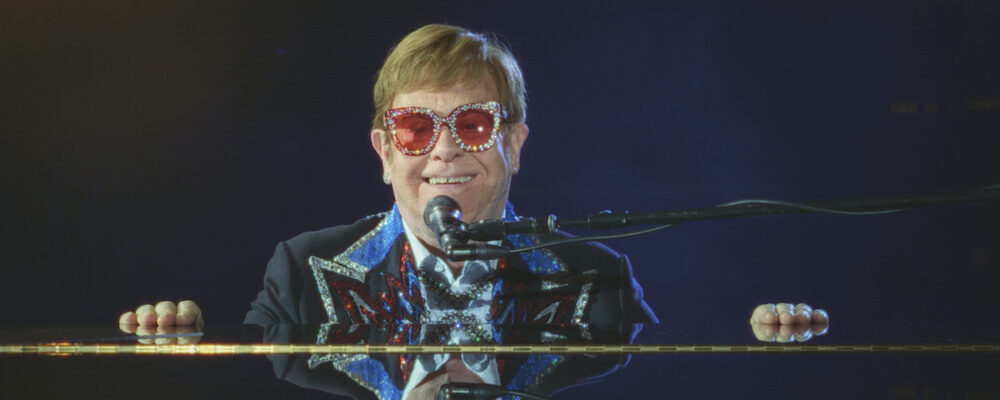‘Elton John: Never Too Late’ Delves Into the Life and Enduring Legacy of the Legendary Rock Star
Sandra Miska
In October 1975, at the height of his stardom, the one and only Elton John performed two sold-out shows at Dodger Stadium in Los Angeles, the first concerts held there since the Beatles in 1966. John’s appearance at the baseball stadium is not only considered to be one of the most legendary concerts, the fully-sequined, Bob Mackie-designed L.A. Dodgers baseball uniform he wore has also been burned into our collective memory. In 2022, 47 years after those legendary nights, John returned to Dodger Stadium for a three-night run, the last show being the final United States concert of his career. “Elton John: Never Too Late” chronicles the lead-up to this finale, while diving into the highs and lows of the Rocket Man’s life and career. There is more to the man, after all, than just tickling the ivories and donning elaborate costumes.
Directed by R.J. Cutler and John’s husband and manager David Furnish, “Never Too Late” does a superb job of spotlighting the different sides of the icon. Although he is well into his seventies, he shows little signs of wanting to slow down, despite his pleas to the contrary. We see him in the studio remixing his classic song “Tiny Dancer,” collaborating with the likes of Dua Lipa, and co-hosting a podcast with Furnish in which he interviews and showcases music from the next generation of artists, including the Linda Lindas and Allison Ponthier. In a memorable moment, John takes issue with referring to Ponthier as “queer,” although his husband assures him that this is now a politically-correct term. And one cannot help but feel warm and fuzzy when the youngsters express their admiration for the rock legend.
On the other hand, John has good reason to want to slow down. He opens up about his feelings on being an older father (he and Furnish have two sons, Zachary, 13, and Elijah, 11, born through surrogacy). People might not always feel comfortable discussing that having children makes them contemplate their own mortality. Both boys appear in “Never Too Late,” and this proud papa is a far cry from the troubled young man who did copious amounts of cocaine in the ’70s and attempted to take his own life in a swimming pool just two days before his first Dodger Stadium show, a dark chapter John discusses in depth.
While “Never Too Late” does not offer any major revelations to longtime devotees of John, they will be satisfied by the archival footage included, along with the intimate audio interviews conducted by Alexis Petridis. Animation is creatively used to illustrate scenes from the Rocket Man’s life as an accompaniment to his words. More casual fans will be intrigued by some of the truths about his early life, such as that he achieved fame and success before he even had an active sex life. His first partner was music manager John Reid, who proved to be abusive. But the real love story here, second to that of John and Furnish, is the platonic creative relationship between John and Bernie Taupin, his longtime songwriting partner. A memorable scene involves John recalling how he confessed his love for Taupin early on, although he states his feelings were never physical.
“Never Too Late” also delves into Elton John’s friendship with John Lennon, another kindred spirit of his. Highlights of this include Elton John recounting a night in which the pair were hanging out when Andy Warhol came knocking. More poignantly, he describes performing with him for what was to become the Beatles’ last concert.
Brandi Carlile, a longtime friend of John and Furnish’s, had an opportunity to view an early cut of “Never Too Late” while visiting the couple in the south of France. The singer-songwriter was so moved by what she saw that she was inspired to write the lyrics for what would become its title track, “Never Too Late.” John then wrote the melody, making this moving song about being a survivor the first collaboration between the pair. Taupin and producer Andrew Watt are also credited as co-writers.
What “Never Too Late” does best is tap into why John has been such an enduring icon. The bespeckled pianist certainly did not initially fit the rock star mold, but has become beloved by the masses not only because of his sheer talent, but also due to his staying true to himself and taking risks, such as coming out as bisexual in 1976, a move that did not come without fallout at the time. He later stated he was gay in 1992. By the time we get to his final Dodger Stadium show, it doesn’t feel like a bittersweet swan song, but like a well-deserved victory lap.
“Elton John: Never Too Late” begins streaming Dec. 13 on Disney+.

